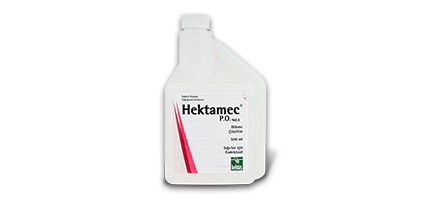
HEKTAMEC® P.O. %0.5
Animal Type : Cattle
Commercial Presentation: It is offered for sale in 500 ml HDPE white (natural) scale bottles, with PP stopper and HDPE white foil cap, unboxed.
Active Ingredient: 5 mg/ml ivermectin
Method Of Application
HEKTAMEC-P.O. 0.5% Bulk Solution is a colorless or light yellow, clear oily-looking solution.
AREA OF USE / INDICATIONS
HEKTAMEC-P.O. 0.5% Bulk Solution is used for the treatment and protection of infections caused by the following parasites in cattle.
Gastro-intestinal nematodes: Ostertagia ostertagi (4th stage larvae including adults and inhibited larvae), Haemonchus placei (adults and 4th stage larvae), Trichostrongylus axei (adults and 4th stage larvae), Trichostrongylus colubriformis (adults and 4th stage larvae) ), Cooperia spp. (adults and 4th stage larvae), Oesophagostomum radiatum (adults and 4th stage larvae), Strongyloides papillosus (adults)
Lung worms: Dictyocaulus viviparus (adults and 4th stage larvae)
Nocra factor (parasitic stage): Hypoderma bovis, Hypoderma Lineatum
Lice: Haematopinus eurysternus, Solenopotes capillatus, Damalinia bovis
Scabies: Sarcoptes scabei var. bovis, Chorioptes bovis. The product can be used to reduce infestation in Chryoptes bovis, complete elimination may not occur.
HEKTAMEC-P.O. When 0.5% Bulk Solution is used at recommended doses, Trichostrongylus axei and Cooperia spp. It is effective up to day 14 for Ostertagia ostertagi and Oesophagostomum radiatum, and up to day 28 for Dictyocaulus viviparus (lungworm).
It also provides control for horn fly (Haematobia irritans) up to 35 days from treatment.
APPLICATION AND DOSAGE
HEKTAMEC-P.O. 0.5% Bulk Solution is used at a dose of 1 ml/10 kg body weight as 0.5 mg/kg body weight. The lid of the plastic bottle is opened, the bottle is slightly squeezed, and the solution is filled into the upper chamber. It is then applied by pouring it from the animal’s wither area to the coccyx.
Warnings
– There are some clinical observations that paresis and paraplegia occur as a result of the death of Hypoderma bovis larvae that have entered the spinal cord during migration, and salivation and secondary tympani due to esophageal paralysis as a result of the death of Hypoderma lineatum larvae. For Nokra control, application should be preferred after the end of the Nokra Fly season.
– Regardless of the parasite, the application must cover all animals in the herd in order for the parasitic control to be successful.
– Hektamec-P.O. once at the entrance to the fattening of the cattle taken to the stable. 0.5% Bulk Solution application is usually sufficient.
– The best results can be obtained in the pasture season of that year when 3 applications are made to the young animals that go out to the pasture for the first time, in the 3rd, 8th and 13th weeks following the pasture.
– It should not be applied on wet and/or mud/feces-contaminated hair or skin. Rainfall within 2 hours after the application may cause the effectiveness of the product to decrease. It should not be applied to damaged skin, crusted lesions or other lesions.
– Treated animals should be kept away from waterways and surface waters during treatment.
– Resistance to ivermectin has been reported in Ostertagia ostertagi in cattle. Therefore, local epidemiological data should be taken into account when using the product.
– The following practices should be avoided as they will increase the risk of resistance development and ultimately render the treatment ineffective:
– Too frequent and repeated use of anthelmintics in the same group over a long period of time
– Underdosing due to incorrect body weight determination, product misapplication, or the dosing device not being calibrated.
– When the development of resistance to anthelmintics is suspected, it should be investigated further by performing appropriate tests (eg, fecal egg count reduction test). If the results of the tests clearly show the development of resistance to a particular anthelmintic, a drug with a different mechanism of action belonging to another anthelmintic class should be used.
